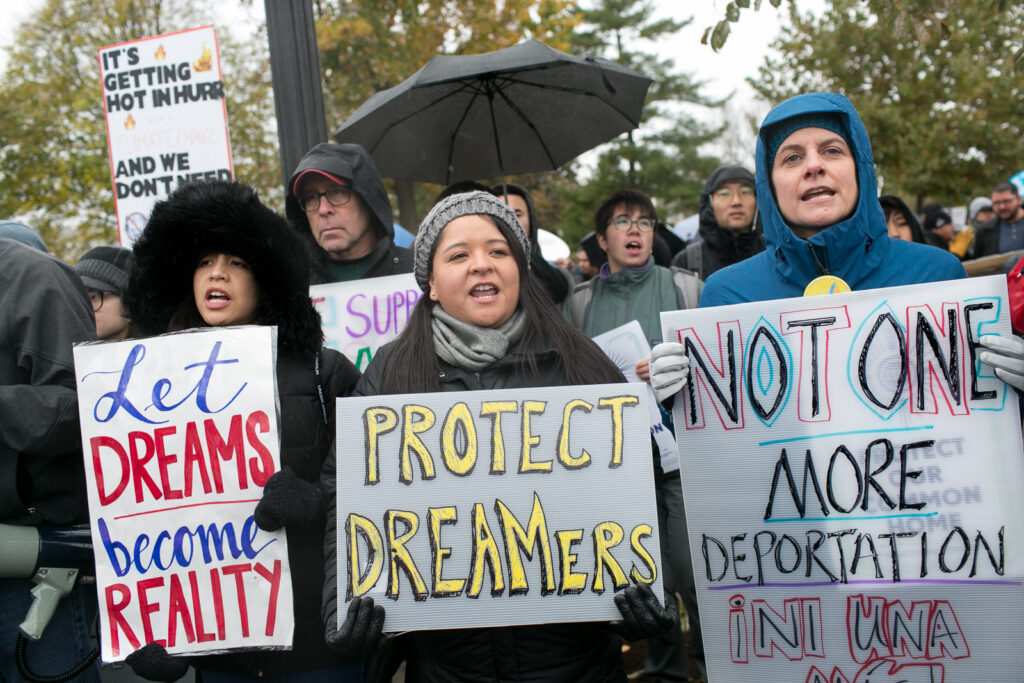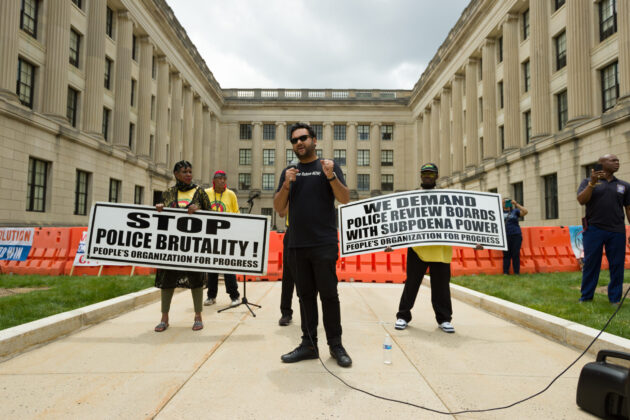Community Spotlights are question-and-answer features that highlight Dodge Foundation grantees, partners, funders, giving circles, staff and trustees, all of whom are working to transform New Jersey into a model of racial justice and equity where everyone can thrive. For this Community Spotlight, we spoke to the Amol Sinha, Esq., of ACLU of New Jersey.
Tell us about your organization and your role.
The American Civil Liberties Union of New Jersey is a multi-issue, multi-tactic civil rights, civil liberties, and racial justice organization. We utilize an innovative model of integrated advocacy – using impact litigation, legislative advocacy, public education, organizing, and strategic communications in harmony to achieve our transformative policy goals. We strengthen core principles – like freedom, equality, justice – but our work is about the people who have been historically deprived of them. We continually strive to be informed by directly impacted communities and individuals in our work, centering voices of those experiencing injustice. The ACLU-NJ is a state affiliate of the ACLU, and we have approximately 30,000 members and thousands more supporters across New Jersey.
We continually strive to be informed by directly impacted communities and individuals in our work, centering voices of those experiencing injustice.
I am truly honored and humbled to be the ACLU-NJ’s executive director. In my role, I have the privilege of leading a team of brilliant and generous colleagues who are indefatigable in their pursuit of justice. During my tenure, we have seen tremendous growth, resulting in enormous change to our state’s civil rights landscape. Routinely, we appear before the New Jersey Supreme Court more often than any other organization other than the government itself, and increasingly, we are demonstrating our political power across New Jersey’s institutions. In part, my job is to lead our integrated advocacy, set our bold and strategic vision, and ensure my colleagues have what they need to do their jobs in a healthy, sustainable way. Addressing injustice day-in and day-out can take a toll on one’s well-being – I am committed to ensuring our team is cared for and well-equipped to do its transformational, and often lifesaving, work.
What’s your vision for a just and equitable New Jersey?
For over 60 years, the ACLU-NJ has defended liberty and justice guided by the vision of a fair and equitable New Jersey for all. To me, this means that the individual rights and liberties guaranteed to every New Jerseyan by the state and federal constitutions are preserved, advanced, and extended in the Legislature, in the courts, and in our communities. It also means that economic and social opportunities are equitably afforded to everyone, and that all people – no matter their race or immigration status or zip code – are given the chance to thrive.
What’s the mission and vision of your organization? What is the change you are hoping to make in New Jersey and more generally?
The ACLU-NJ envisions a just and fair New Jersey where laws exist to protect the civil rights and civil liberties of all. The ACLU-NJ’s mission is to fight civil rights violations throughout New Jersey, whenever they occur – working daily in courts, the legislature, and communities to defend, preserve, advance, and extend the individual rights and liberties guaranteed to all people in this state by the constitutions and laws of New Jersey and the United States.

Our organization strives to be anti-racist and is actively committed to advancing racial equity and racial justice in the institutions of New Jersey, for the people of New Jersey, and within the ACLU-NJ itself. Being anti-racist requires intentional, decisive actions rooted in a historical understanding of how local, state, and federal laws and policies create and sustain a culture of white supremacy. As a staff, we prioritize continued learning and growth about racism, sexism, classism, and all the other systems of inequity and repression in which we live and function, and our work reflects this continued education.
We hope to equalize the power of all voices in the court system, the legislature, other arms of government, and in access to financial and other resources. This can only be done by centering the voices of people and groups whom we serve and who historically have not been fully protected by our systems of law, justice, and society. We believe that people should have input into decisions that affect them. It is our obligation to grow our awareness of the relations and dynamics of power in our work in the world. We aim to perceive them, name them, and with compassion and commitment, to do all in our power to shift them toward justice.
When did you know this is what you wanted to do with your career?
It was an evolution. From a young age, I knew I wanted to have an impact in my community. I grew up in Central Jersey and was one of the few kids in my school who was South Asian and the child of immigrants, which I carried with great pride, and which exposed me to degrees of injustice early on in life. Not knowing where I fell in our nation’s unjust racial hierarchy, I experienced my fair share of bias, bullying, and aggression based on my identity. It took going to college then law school to truly understand and name the problems of systemic racism and xenophobia, and how they are perpetuated in our country. And it took working in social justice to be able to articulate some of the solutions. I learned that the threads of injustice were intertwined, and that struggles for liberation were bound together across communities.
Perhaps informed by my experiences and bolstered by intellectual curiosity, I was drawn to law school and the study of civil rights and constitutional law. Throughout college and law school, I worked in public service and at public interest organizations and philanthropies, including a legal internship at ACLU National, working on national security, human rights, and First Amendment litigation, which was eye-opening for me. By then, I knew I wanted to work in the public interest and that I wanted to utilize my knowledge of the law and curiosity about the world to help people, disrupt the racial hierarchy, and end white supremacy. I’m still evolving, as we all are, but I’ve been lucky to be able to find purpose and meaning in my work, which is a gift.
What’s an example of your work having the impact you envisioned? What’s a success story for you?
When the pandemic began in early 2020, New Jersey had the nation’s highest COVID-19 death rate in prisons. New Jersey also has the highest Black-white racial disparities in its prisons. This presented not only a public health crisis, but a racial justice crisis too.
We had to act, so we litigated to release people from jail, and we joined with incarcerated people, their families, and other advocates to pass the Public Health Emergency Credits Law (PHEC), which allows people nearing their release dates to leave prison up to 8 months early. When the latest wave of people come home, 8,251 people will have been released since the law took effect in November 2020. The law has shown the urgency of decarceration and provided a nationwide model for lowering the prison population while preserving public health and public safety. On top of New Jersey’s nationally low recidivism rates, people released under PHEC have been rearrested at lower rates than others who have served their entire sentence.
At its heart, the Public Health Emergency Credits law is not only a pandemic policy, it’s a policy about humanity. No one deserves gratuitous suffering. That was true before the pandemic, and it will remain true for the daily injustices of over-incarceration well beyond.
What’s next for you and your organization? What’s your big rock for the next 12 months?
Right now, I’m focused on strategically growing the ACLU-NJ and maximizing its potential in our state’s legal, political, and community spaces. We have just completed a year of major strategic planning and I am excited about implementing our strategic framework and working toward our ambitious goals, both for our organization internally and for the state of New Jersey.
There’s no one “rock” per se, but there are ongoing threats to our civil rights and liberties across the country. We see reactionary pushback on criminal legal reform, attempts to undermine or eliminate reproductive freedom, attacks on “critical race theory” and racial justice conversations, policies and rhetoric endangering the lives of transgender community members, xenophobic and racist viewpoints paraded as reasonable, and concerted efforts to undermine our democracy and diminish voting rights, particularly for people of color and other marginalized communities. All of these issues have impacts in New Jersey.
But I remain undeterred. We are continuing to build the ACLU-NJ’s power, we are continuing to uplift directly impacted voices, our partners, and those who are in the struggle with us, and we are fighting strategically – using all of the tools in our toolbox to achieve justice and fairness. A strong ACLU-NJ yields a stronger New Jersey. It’s in these moments of uncertainty that the ACLU is vital to restoring hope and faith in our democracy. It’s in these moments that the ACLU shines brightest.
